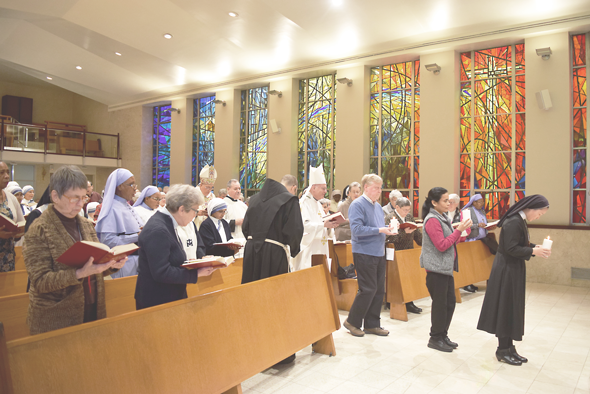
My dear brothers and sisters in the Lord,
The 24th World Day of Consecrated Life, established by St. John Paul II, gives us an opportunity to focus our attention on the necessity of consecrated life in the life of the Church. Consecrated life is rooted deeply in the example of the teaching of Jesus Christ, who gave us the evangelical counsels: a life of poverty, chastity and obedience. If they were ever counter-cultural values, they are even more so in our world today when each of these three counsels seems to be something from another world. Who wants to live in poverty, not having everything one would want? Or who wishes to be chaste in a world that is saturated with sexual temptation and satisfaction? And who wishes to obey the will of someone else, when everyone feels that they have a right to do whatever seems right to them? Truly, the evangelical counsils remind us that some men and women are willing and ready to give themselves to God with their undivided hearts and with full dedication. Some are called to leave behind what the world considers important, so that they may give themselves fully to the evangelization of others which is facilitated by living out the evangelical counsels each day.
In a certain sense, we were spoiled in the last 50 years for having a multitude of religious women and men serving the needs of the Church. Certainly, our religious women who functioned as teachers of our children made an incredible impact on the life of the Church in the United States. Besides the healthcare field and other social needs in which they ministered, the teaching apostolate was perhaps the most fruitful evangelization of our children. They knew and understood their faith, not because they were coerced to do so, but because they saw the example of good faith in those who dedicated themselves to their care.
Recently, I visited my first-grade teacher, Sister Dorothy, a Sister of Charity of St. Elizabeth, who is 98 and currently residing in a nursing home. Sister’s mind is as clear as the day she taught me at Sacred Heart Cathedral grammar school in Newark, New Jersey. She is just one example of the good influence religious women had on their students for whom they become surrogate mothers. I was surprised that she knew of the false accusation made against me. Sister told me how much this angered her and that I should fight this false accusation with all of my energy.
Obviously, today we do not have the multitude of young people who are ready and willing to live a religious life. We must remind ourselves, however, that several years ago, when we looked for the obstacles as to why our young people were not accepting vocations to the priesthood and religious life, a survey was undertaken with the assistance of St. John’s University. The results of that survey found an incredible fact. The highest variable was, “No one ever asked me.” When we dug deep into the data, we found that almost 700 young women — high school juniors, seniors and college-aged — said that they would be open to accepting a religious vocation, but that they knew little about what the responsibilities were to such a vocation. They understood, however, that a life of service to the Church was necessary in our world.
The response was the same for young men of the same age group. Again, almost 10 percent said that they would be willing to accept a vocation to the priesthood or religious life because they saw its necessity in the life of the Church. We must accept the fact that we will have fewer consecrated men and women, however, we cannot accept the fact that there will be no consecrated women and men to lead the Church into the future. We must pray and act in a way that enables young people to understand what it means to live a consecrated life and to consider a vocation in this way. Not only do I ask for your prayers, but also the encouragement that you can give to young people who might consider giving their lives to Christ and His Church in the ultimate commitment to religious life.
Every year in our own Diocese in Brooklyn and Queens, we celebrate the Feast Day of the Presentation of the Lord for our women and men religious. This year, our celebration was held on February 1, and the gathering included a keynote speaker, Sister Maureen Sullivan O.P., to address the attendees. The day concluded with a Mass that enabled each to rededicate themselves to their vows and charism of their order. It is interesting to note that our Holy Father, Pope Francis, as a Jesuit, gives such a great example of a unique understanding of the Evangelical Counsels as a leader in the world today. Who is more dedicated to the poor of the world than Francis himself, who has shown a greater respect for the chastity necessary to carry out the work of the Church? And who himself has shown that obedience by all to the Word of God and His law is so necessary for the life of the Church.
As we put out into the deep waters of what consecration is all about, we realize that separation and dedication has a great impact on those who live the life and on those who observe their lives. This has been the glory of the Church for the past several centuries. I would dare say that it will continue into the future to be a charism so necessary for evangelization. Although it might be expressed by fewer people, this charism will be even more important in the future.
Follow Bishop DiMarzio on Twitter @BpDiMarzio
facebook.com/bishopdimarzio

May Our Lord always bless you and keep you, your excellency.